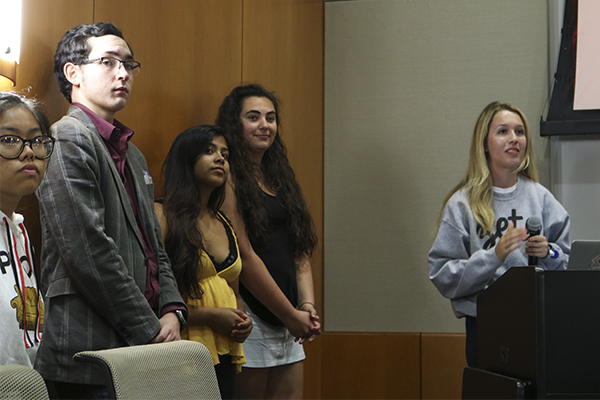In an effort to increase student voter turnout, Student Government proposed a joint resolution to excuse student absences during election days at its meeting Tuesday.
The resolution, made in collaboration with the Senate of College Councils and the Graduate Student Assembly, would only excuse students from class if they vote. After voting, students would scan a QR code, and professors would receive information from the QR code system to grant excused absences, according to the resolution.
Kerry Mackenzie, the ethics and oversight committee chair, and Jack Bumgardner, co-director of SG’s Hook the Vote agency, authored the resolution.
“We understand this legislation isn’t going to solve every voting-related issue, but it is going to ensure that students don’t have to choose between going to class and casting their ballot,” said Bumgardner, an international relations and global studies sophomore. “We encourage all students to vote during early voting, but we want this legislation to help people who might fall through the cracks.”
The resolution would allow students two hours to vote on campus or off campus. Mackenzie, a government and Plan II sophomore, said SG could send the QR code with people to off-campus voting locations so students voting there could still be excused.
Professors with special coursework plans for Election Day could submit concerns to a committee of students and faculty, which would then decide whether the professor could disregard the legislation, according to the resolution. Excused students would still need to complete in-class activities and assignments, according to the resolution.
SG sent the legislation to the Faculty Council, and its Educational Policy Committee said they would consider the legislation but had multiple questions. Christine Julien, chair of the Educational Policy Committee, said she wants to meet with SG representatives to discuss the legislation.
“It’s fantastic that Student Government is working hard to encourage students to vote,” said Julien, an electrical and computer engineering professor. “I’m very supportive of encouraging everyone to vote and think it’s important to reduce barriers to people voting.”
So far, 11 SG representatives and one Senate representative have sponsored the resolution. University-wide representative Nora Balli said she decided to sponsor the resolution because of the importance of student voices.
“There’s only two polling places on a campus with 50,000 students, and early voting can be discouraging because there are really long lines,” public health sophomore Balli said. “A lot of students who live in Riverside or North Campus only come to campus for classes and don’t have the time to spend hours waiting in line to vote while they are here.”
Bumgardner said SG hopes to implement the legislation by November 2020.
“There’s a stigma that students and young people are not interested in politics, and the numbers show that simply isn’t true,” Bumgardner said. “I want to help every student understand their vote does matter. Individuals getting into a habit of voting will create civically engaged people in the future.”





















